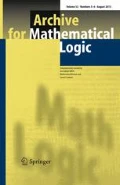Abstract
Several investigations in probability theory and the theory of expert systems show that it is important to search for some reasonable generalizations of fuzzy logics (e.g. Łukasiewicz, Gödel or product logic) having a non-associative conjunction. In the present paper, we offer a non-associative fuzzy logic L CBA having as an equivalent algebraic semantics lattices with section antitone involutions satisfying the contraposition law, so-called commutative basic algebras. The class (variety) CBA of commutative basic algebras was intensively studied in several recent papers and includes the class of MV-algebras. We show that the logic L CBA is very close to the Łukasiewicz one, both having the same finite models, and can be understood as its non-associative generalization.
Similar content being viewed by others
References
Blok W.J., Pigozzi D.: Algebraizable logics. Mem. AMS 77, 396 (1989)
Botur, M.: An example of a commutative basic algebra which is not an MV-algebra. Math. Slovaca (to appear)
Botur, M.: Subdirectly irreducible commutative basic algebras are linearly ordered. Algebra Universalis (submitted)
Botur M., Halaš R.: Finite commutative basic algebras are MV-algebras. Mult. Val. Log. Soft Comp. 14(1–2), 69–80 (2008)
Botur M., Halaš R.: Complete commutative basic algebras. Order 24, 89–105 (2007)
Botur, M., Chajda, I., Halaš R.: Are basic algebras residuated lattices? Soft Comp. doi:10.1007/s00500-009-0399-z
Chajda I., Halaš R.: A basic algebra is an MV-algebra if and only if it is a BCC-algebra. Int. J. Theor. Phys. 47, 261–267 (2008)
Chajda I., Kolařík M.: An independence of axioms for basic algebras. Soft Comp. 13(1), 41–43 (2009)
Chajda, I., Halaš, R., Kühr, J.: Multiple Valued Quantum Algebras Algebra Universalis, 28pp. doi:10.1007/s00012-008-2086-9
Chajda, I., Halaš, R., Kühr, J.: Semilattice structures, 228pp. Heldermann Verlag, Lemgo (2007) (ISBN 978-3-88538-230-0)
Chang C.C.: Algebraic analysis of many valued logics. Trans. Am. Math. Soc. 88, 464–490 (1958)
Cignoli R.L.O., D’Ottaviano M.L., Mundici D.: Algebraic Foundations of Many-valued Reasoning. Kluwer, Dordrecht (2000)
Cintula P.: Weakly implicative (Fuzzy) logics. Arch. Math. Log. 45(6), 673–704 (2006)
Durante F., Klement E.P., Mesiar R., Sempi C.: Conjunctors and their residual implicators: characterizations and construction methods. Mediterr. J. Math. 4, 343–356 (2007)
Dvurečenskij A., Pulmannová S.: New Trends in Quantum Structures. Kluwer/Ister Science, Dordrecht/Bratislava (2000)
Foulis D., Bennett M.: Effect algebras and unsharp quantum logics. Found. Phys. 24, 1325–1346 (1994)
Gispert J., Mundici D.: MV-algebras: a variety for magnitudes with archimedean units. Algebra Univers. 53, 7–43 (2005)
Hájek P.: Metamathematics of Fuzzy Logic. Kluwer, Dordrecht (1998)
Hájek, P., Mesiar, R.: On copulas, quasicopulas and fuzzy logic. Soft Comp. (to appear)
Klement E.P., Kolesárová A.: Extension to copulas and quasicopulas as special 1-Lipschitz aggregation operators. Kybernetika 41, 329–348 (2005)
Kreinovich V.: Towards more realistic (e.g., non-associative) ‘and’- and ‘or’-operations in fuzzy logic. Soft Comp. 8, 274–280 (2004)
Nelsen R.B.: Copulas and quasi-copulas: an introduction to their properties and applications. In: Klement, E.P., Mesiar, R. (eds) Logical, Algebraic, Analytic and Probabilistic Aspects of Triangular Norms, pp. 391–414. Elsevier, Amsterdam (2005)
Nelsen R.B.: An introduction to copulas. Springer, New York (1999)
Riečanová Z.: Generalization of blocks for D-lattices and latticeordered effect algebras. Int. J. Theor. Phys. 39, 231–237 (2000)
Ward M., Dilworth R.P.: Residuated lattices. Trans. Am. Math. Soc. 45, 335–354 (1939)
Yager R.R.: Modelling holistic fuzzy implication using co-copulas. Fuzzy Optim. Decis. Making 5, 207–226 (2006)
Zimmerman H.H., Zysno P.: Latent connectives in human decision making. Fuzzy Sets Syst. 4, 37–51 (1980)
Author information
Authors and Affiliations
Corresponding author
Additional information
This work is supported by the Research and Development Council of the Czech Government via the project MSM6198959214.
Rights and permissions
About this article
Cite this article
Botur, M., Halaš, R. Commutative basic algebras and non-associative fuzzy logics. Arch. Math. Logic 48, 243–255 (2009). https://doi.org/10.1007/s00153-009-0125-7
Received:
Revised:
Published:
Issue Date:
DOI: https://doi.org/10.1007/s00153-009-0125-7




